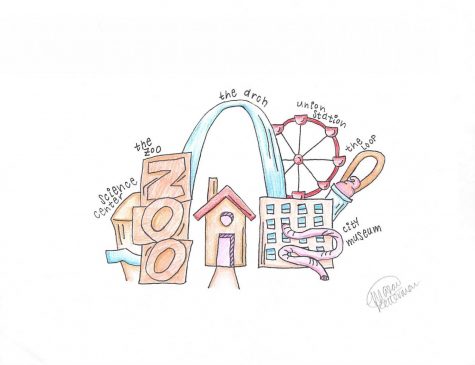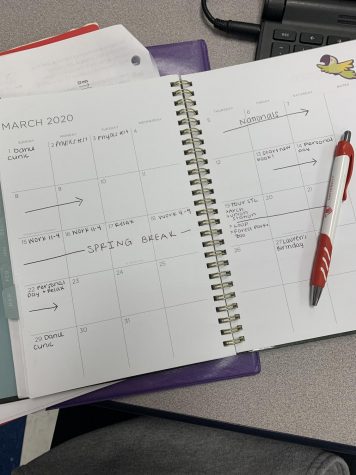AP Course selection process stresses students
Media by Jilian Bunderson
The pressures of AP classes weigh down students. These past weeks students have picked their courses and decided what is right for them, but often they just try to stack up on AP. “Last year when picking my courses for junior year, I was unsure about how many AP I should take and what would be best to take as AP and what would be better as regular,” Megan Crawford, junior, said.
Although course registration for this year has wrapped up, many students like Megan Crawford, junior, felt pressured to challenge themselves with AP and honors classes.
“I felt pressured, especially when entering my junior year because I felt it was the norm for juniors,” Crawford said. “During this past year though, I have come to the realization that the only classes that I should take as AP should be the ones that will be beneficial for me later.”
Crawford took both AP Government and AP Language and Composition this past year, and although she has been enjoying both classes, Crawford said she has realized they might not have been the most useful. I felt pressured, especially when entering my junior year because I felt it was the norm for juniors. — Megan Crawford
“I don’t plan on studying the government later or working in the government,” Crawford said. “So even though I am enjoying the class and find it interesting, it won’t be as helpful.”
Amy Doyle, AP European History teacher, and Alex Nelle, AP World History teacher, understand that students can feel pressured to take AP courses in classes they aren’t necessarily passionate about.
“I think there is certainly a blend of people who take [AP courses] out of the desire to learn the subject and those who take it because they feel obligated to do so,” Doyle said. “I think students should consider their course load carefully by assessing the difficulty of each course to ensure that they can keep up with the rigor of multiple challenging courses. I also think that students should gauge their interest in each subject as well.”
Doyle also said students learn critical thinking and time management skills in AP courses.
“But I also think people should lead balanced lives and being able to juggle demanding coursework with a busy extracurricular schedule or other obligations is not for everyone,” Doyle said.
Nelle understands the difficulty of the decision and need for balance in one’s schedule.
“If a student is thinking about taking an AP class, they should first decide if the subject is something that they are truly interested in. Each AP course will require a dedicated effort, so students need to make sure they are willing to put in the time and effort before taking an AP course,” Nelle said. “I also think students should balance the number of AP courses they should take in high school because students should enjoy their high school experience, as you only get that one time, so I don’t believe they should spend six-eight hours a night studying for four or five AP courses.” I don’t believe they should spend six-eight hours a night studying for four or five AP courses. — Alex Nelle
Julia Devlin, sophomore, looked a lot at balance when choosing classes. She felt pressured into taking multiple AP courses her junior year, especially since most of her junior and even fellow sophomore friends were taking them, but she was able to receive guidance from others.
“I was lucky that I have an older sister that used to go to Marquette who could give me advice on classes,” Devlin said. “I felt pressured, but luckily she helped me destress and decide on one class that would be beneficial for me.”
Devlin understands that many of her fellow students don’t get as much guidance with classes and feel pressured by parents, other students and teachers to stack up on AP courses.
Tim Eggleston, Mizzou admissions representative for the St. Louis region, said the decision to take AP courses differs depending on students’ personal preferences and their college decisions.
“For students looking to be challenged by college-level coursework and discussion, I think AP courses are definitely a great option,” Eggleston said. “Additionally, many highly-selective colleges will look to see if a student challenged themselves in high school by taking honors and AP courses.”
However, Eggleston said AP and honors courses aren’t right for everyone and deciding what is right can be difficult.
“I think a student should talk with their counselor and the teachers who are teaching the AP courses to learn more about what the class entails and if it might be a good option,” Eggleston said. “Just do your research, talk to students who have taken the course and give it a try. If you like your first AP course, consider taking another.”
Kaitlyn Lee, senior, has taken and enjoyed AP courses since her sophomore year starting with one course sophomore year, three junior year and two senior year. It’s super overwhelming and stressful at times, but I have no regrets. — Kaitlyn Lee
“All my siblings took AP and honors classes, so I felt I should to keep up with them,” Lee said. “It’s super overwhelming and stressful at times, but I have no regrets.”
Lee said she spends about one to two hours on AP course work each night as well as participating in three varsity sports and studio dance.
“If the subject is something you are passionate about or will benefit you and your future, then I would recommend it,” Lee said. “They are a lot of work, just don’t stress out about them too much and consider your time.”
Your donation will support the student journalists of Marquette High School. Your contribution will allow us to purchase equipment and cover our annual website hosting costs. You may become a PATRON by making a donation at one of these levels: White/$30, Green/$50, Blue/$100. Patron names will be published in the print newsmagazine, on the website and once per quarter on our social media accounts.

Caroline Cudney, senior, is the Arts and Entertainment Editor for the Marquette Messenger. She is also involved in Mystique, Dazzlers, Best Buddies, NHS,...

Jilian Bunderson, senior, is the Illustrator for the Messenger. She is also the co-president of Renaissance, a member of NHS, and has been involved in...













